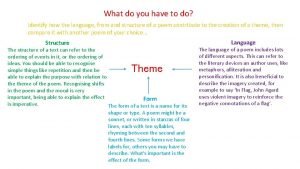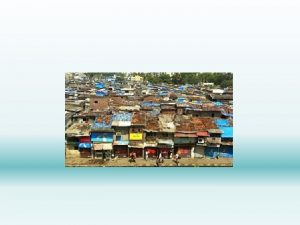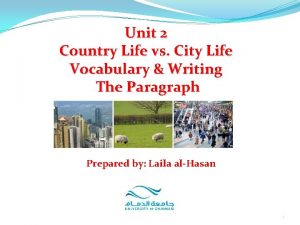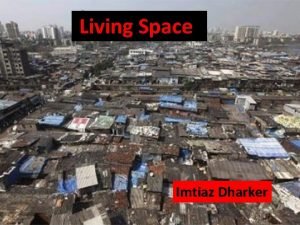IMTIAZ DHARKER LIFE OF IMTIAZ DHARKER Imtiaz Dharker







- Slides: 7

IMTIAZ DHARKER

LIFE OF IMTIAZ DHARKER Imtiaz Dharker (Born 1954) is a Scottish Muslim, poet, artist and documentary film-maker. She was born in Lahore to Pakistani parents. She was brought up in Glasgow where her family moved when she was less than a year old. She was married to Simon Powell, the founder of the organization Poetry Live, who died in October 2009 after surviving for eleven years with cancer. Dharker divides her time between London, Wales, and Mumbai. She says she describes herself as a "Scottish Muslim Calvinist". Her daughter Ayesha Dharker, is a well known actress in international films, TV and stage. As of 2010 she has written five books of poetry Purdah (1989), Postcards from God (1997), I speak for the Devil (2001), The Terrorist at my Table (2006) and Leaving Fingerprints (2009) (all self-illustrated). She is a prescribed poet on the British AQA GCSE English syllabus. Her poems Blessing and This Room are included AQA Anthology, Different Cultures, Cluster 1 and 2 respectively. The main themes of her poetry include home, freedom, journeys, geographical and cultural displacement, communal conflict and gender politics. All her books are published by the poetry publishing house Bloodaxe. Purdah And Other Poems deal with the various aspects of a Muslim woman's life where she experiences injustice, oppression and violence engineered through the culture of purdah. She was part of the judging panel for the 2008 Manchester Poetry Prize, with Carol Ann Duffy and Gillian Clarke. For many she is seen as one of Britain's most inspirational contemporary poets. Dharker is also a documentary film-maker and has scripted and directed over a hundred films and audio-visuals, centring on education, reproductive health and shelter for women and children. In 1980 she was awarded a Silver Lotus for a short film. An accomplished artist, she has had nine solo exhibitions of pen-and-ink drawings.

HER PLACE IN INDIAN POETRY Imtiaz Dharker (1954 -) lives with the passion of an undaunted rebel, not to retreat and not to fail. The intensity and eloquence of her life and poetic accomplishment have dumbfounded the male-chauvinists and have left her female counterparts in soaring spirits not only inside the Islamic social, cultural and religious setup but also outside it. That is why her life and poetry make a fascinating study in the crushing indictment of the suppressive prescriptions against the freedom, dignity and respectful living of women, especially in the Muslim society. Imtiaz confirms our convictions that socio-cultural and socio-religious restrictions on women have robbed them of all their potentialities leaving them not only physically and mentally handicapped but also psychological wrecks age after age. The lived experiences of Imtiaz have been honestly expressed in her poetry with the courage of conviction. Her humanistic and feministic concerns with her anguish and agony, sympathy and protest give the message silently, though its deafening explosion has been felt everywhere. That is the reason that her rebellion has caused a flutter in the petticoats of the guardians of orthodox religion, custodians of culture and the pettifogging politicians. The substance, spirit and style of her daily living hold everyone to sway. Imtiaz Dharker belongs to that generation of post-independence women poets who have given a convincing assurance that Indian English Poetry matches the best anywhere. Among these poets, we may include Kamla Das, Melanie Silgardo, Sujata Bhatt, Eunice de Souza, Mamta Kalia, Tara Patel etc. They have not only broadened thematic concerns of Indian English Poetry but also shown how words and images – simple, suggestive and highly evocative – can recite the music of their anguish and agony, their irritations and humor, their observations and reflections with no sign of pretension. This serious and well-considered response to the observed and lived experiences is a drama of daily life here and there poeticized. Not only the technical excellence but also the pain and poignancy endured in suffocation and suppression have found a justifiable outlet in their creative instinct. Imtiaz Dharker regards herself as a Scottish Calvinist Muslim and her poetry is a confluence of three cultures. It reflects and depicts her deeply sensitive and keenly insightful understanding and response to these three cultures. Her sincerity in handling the issues of social, cultural and religious significance sensitizes the reader equally well. The delicacy and the tenderness that run in her silky strains awakens us to the wrongs and songs of the daily life of women under the norms, rules and sanctions laid down by the patriarchal society for power dynamics. She captures even the fleeting moments and thoughts with the rare touch of the artist who is heart and soul, mind and spirit, body and intellect, integrally and indispensably associated with all that is the fragile fabric of life. The surety Imtiaz gives and the impact she creates in so doing leaves the reader stunned. The exquisite simplicity of her style lends to her poems an inimitable brilliant conversation, a lively and stinging comment trapping us in the enchanting romance of The 1000 Nights deconstructed as a morale-booster to feminism.

PURDAH-I One day they said she was old enough to learn some shame. She found it came quite naturally. Purdah is a kind of safety. The body finds a place to hide. The cloth fans out against the skin much like the earth that falls on coffins after they put dead men in. We sit still, letting the cloth grow a little closer to our skin. A light filters inward through our bodies’ walls. Voices speak inside us, echoing in the places we have just left. People she has known stand up, sit down as they have always done. But they make different angles in the light, their eyes aslant, a little sly. She stands outside herself, sometimes in all four corners of a room. Wherever she goes, she is always inching past herself, as if she were a clod of earth and the roots as well, scratching for a hold between the first and second rib. She half-remembers things from someone else’s life, perhaps from yours, or mine – carefully carrying what we do not own: between the thighs a sense of sin. Passing constantly out of her own hands, into the corner of someone else’s eyes. . . while the doors keep opening inward and again inward.

AN EXPLANATION Imtiaz Dharker, with her social and cultural growth and lived experiences spanning three countries- Pakistan, England India- has shown her subtle artistry in exposing the Purdah System in her title poems, poems related to it, in all its complexes of theme and style. The symbolism inherent in purdah also finds its subtlety and simplicity in alien cultural setting. “Purdah-I”and “Purdah-II” need to be read with “Honour Killing”, “Prayer”, “Grace” and “Battle-line. ” This group of poems is packed with vast immensities. We have a fine experience of the force of courage and the force of conviction in the landscape of Imtiaz’s poetry, though her poetic potentiality is no less strong in other poems. “Purdah-I” is a discreet protest and an eloquent criticism of the tradition of veil strictly sanctioned and imposed on Muslim women. Our attention is focused on the turning point in the life of a Muslim girl when she suddenly becomes conscious of her sexual growth, others are perhaps more conscious. Imtiaz Dharker, with her social and cultural growth and lived experiences spanning three countries- Pakistan, England India- has shown her subtle artistry in exposing the Purdah System in her title poems, poems related to it, in all its complexes of theme and style. The symbolism inherent in purdah also finds its subtlety and simplicity in alien cultural setting. They notice her shame but purdah is a protection against undesirable, vulgar and vile looks of staring people. So Eunice de Souza regards “purdah not just as concealing garment but as state of mind. ” Purdah is suppressive and deadening to the intellectual awakening and growth of a woman and it is damaging to her personality. Purdah is a symbol of alienation and isolation from the outside world. It is a wall between the woman and the world. The result is that she is devoid of the first hand experience and the enlightenment this world has to offer. There is nothing refreshing in it; it curbs and restricts the speech and full expression; it is a repression of will and choice.

SOME MORE WORKS OF HER EXPLAINED In “Grace”, ”Prayer” and “Sacrifice”, Imtiaz Dharker narrates how sacred works, truth and grace are perverted in Islamic culture. Muslim women are segregated and suppressed by ironically using the principles of Islam. The poems foreground how the sacred space has been violated by perverting and polluting the Islamic culture-ironically using the tenets of Islam itself. In her poem, Grace, the central idea is mosque. Imtiaz finds that custom enforced by orthodox maulvis in charge as a ‘keeper’ of conscience discriminates Muslim women even at God’s space. In ‘Prayer’, Dharker explodes the hypocrisy of prayers. In her poem, ‘Sacrifice’, Dharker criticises the symbolism of lamb’s sacrifice in Islam.

HER CRITICAL ACCLAMATION Her work has been described by critic Bruce King as “consciously feminist, consciously political, consciously that of a multiple outsider, someone who knows her own mind, rather than someone full of doubt and liberal ironies”. Alan Ross in London Magazine terms this “a strong, concerned economical poetry in which political activity, homesickness, urban violence, religious anomalies, are raised in an unobtrusive setting, all the more effectively for their coolness of treatment. ”










